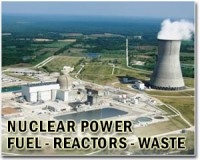 |
Tokyo (AFP) March 12, 2011 Japan's nuclear authorities warned Saturday that quake-hit atomic plant Fukushima No. 1, about 250 kilometres (160 miles) northeast of Tokyo, "may be experiencing a nuclear meltdown", media said. Kyodo News agency said radioactive caesium had been detected near Fukushima plant, citing the Japanese nuclear safety commission. The cooling system of the plant was damaged in the massive earthquake that struck the region 24 hours earlier, leaving the government scrambling to fix the problem and evacuate more than 45,000 residents within a 10-kilometre (six-mile) radius). Thousands were also evacuated from near a second plant, Fukushima No. 2, which also suffered damage to its cooling system. Parts of the No. 1 reactor's nuclear fuel rods were briefly exposed to the air Saturday after cooling water levels dropped through evaporation, and a fire engine was pumping water into the reactor, Jiji Press reported. The water levels were recovering, said operator Tokyo Electric Power (TEPCO), according to Jiji. A TEPCO spokesman told AFP that "we believe the reactor is not melting down or cracking. We are trying to raise the water level." Public broadcaster NHK quoted Japan's nuclear and industrial safety agency as saying that metal tubes which contain uranium fuel may have melted. The broadcaster quoted Tokyo University professor Naoto Sekimura as saying that "only a fraction of the fuel may have melted but the reactor had already been stopped and is being cooled. I urge residents to act calmly." The government Friday declared an atomic emergency amid growing international concern over its reactors after the 8.9 magnitude earthquake, the biggest in Japan's history, unleashed tsunamis that swept all before them. When Friday's massive quake hit, the plants immediately shut down, along with others in quake-hit parts of Japan, as they are designed to do -- but the cooling systems failed, the government said. When reactors shut down, cooling systems must kick in to bring down the very high temperatures. These systems are powered by either the external electricity grid, backup generators or batteries. The fear is that fuel rods, if they can't be cooled, become exposed and release radioactivity, leading to a meltdown. A meltdown is a severe nuclear power plant failure in which the reactor core is unable to properly cool, leading nuclear fuel assemblies to overheat and melt, potentially releasing radioactive materials into the environment. Tokyo Electric Power Saturday vented radioactive vapour at five reactors between both plants to release building pressure. On Friday the US Air Force, which has many bases in Japan, delivered coolant to a Japanese nuclear plant, US Secretary of State Hillary Clinton said Friday, without specifying which plant. Japan's Prime Minister Naoto Kan early Saturday visited Fukushima by helicopter to assess the situation. Japan -- located on the "Pacific Ring of Fire," where several continental plates meet and create a string of volcanoes and seismic hot spots -- records 20 percent of the world's major earthquakes. Japan draws about 30 percent of its total power from 53 nuclear plants.
Share This Article With Planet Earth
Related Links Nuclear Power News - Nuclear Science, Nuclear Technology Powering The World in the 21st Century at Energy-Daily.com
 High radiation in Japan nuclear plant, 'no health hazard'
High radiation in Japan nuclear plant, 'no health hazard'Tokyo (AFP) March 12, 2011 A Japanese nuclear safety panel said Saturday radiation levels were 1,000 times above normal in a reactor control room after a huge quake damaged a plant's cooling system, Kyodo News said. Public broadcaster NHK, quoting nuclear safety officials, said there was "no immediate health hazard" to nearby residents from a possible minute leakage, and people were urged to evacuate the area calmly. ... read more |
|
| The content herein, unless otherwise known to be public domain, are Copyright 1995-2010 - SpaceDaily. AFP and UPI Wire Stories are copyright Agence France-Presse and United Press International. ESA Portal Reports are copyright European Space Agency. All NASA sourced material is public domain. Additional copyrights may apply in whole or part to other bona fide parties. Advertising does not imply endorsement,agreement or approval of any opinions, statements or information provided by SpaceDaily on any Web page published or hosted by SpaceDaily. Privacy Statement |